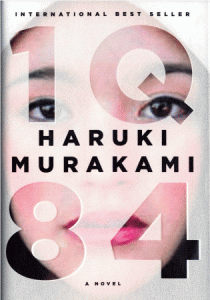 From the end of the fall term until last week, I read 1Q84 (pronounced, right?, /kyoo-teen/ eighty-four?), and I regret the time spent on it. It’s 925 pages. By the end I felt I’d wasted a lot of good hours on a book that should have been 325 pages. Is it a problem with late-career writers, nobody editing them back to decent lengths? I couldn’t finish the last Stephen King book I picked up—Lacey’s Story, was it? Lisey’s?—because after a couple hundred pages I wasn’t halfway through.
From the end of the fall term until last week, I read 1Q84 (pronounced, right?, /kyoo-teen/ eighty-four?), and I regret the time spent on it. It’s 925 pages. By the end I felt I’d wasted a lot of good hours on a book that should have been 325 pages. Is it a problem with late-career writers, nobody editing them back to decent lengths? I couldn’t finish the last Stephen King book I picked up—Lacey’s Story, was it? Lisey’s?—because after a couple hundred pages I wasn’t halfway through.
Look: I like long novels. I liked Infinite Jest, Bleak House, Middlemarch, Portrait of a Lady. I’d like to read Moby Dick. I’d like to read Proust. I’d never argue these novels need to be shorter than they were (because of course history would immediately prove me wrong, as who knows maybe it will with the Murakami). I’m trying to find a solid way to show that the above novels justify their lengths (a tricky task given what we know of Dickens and pay-rates) in ways that 1Q84 does not, and I’m coming up empty.
Or maybe it’s this: if your novel is about one familyless man and one familyless woman and how they come to fall in love, and if you don’t move around in time or space much, and if your secondary characters could all fit comfortably in a Ford Excursion, you don’t have a 900-page novel in front of you. I don’t care how many air chrysalises are being built. I don’t care how swiftly your publisher hires Chip Kidd to turn your overwrought story into a design experience. No debut writer would ever be allowed to get away with this, and why isn’t that more of a problem?